Addressing Business Challenges in Indonesia's Energy Sector: A Report
VerifiedAdded on 2023/01/23
|9
|2273
|93
Report
AI Summary
This report delves into the business challenges confronting Indonesia's energy sector, with a specific focus on the need for renewable energy sources. The paper highlights issues such as price and policy regulations, financial constraints, and cultural differences impacting the sector. It emphasizes the government's role in promoting energy diversification and cleaner energy for the future. The report analyzes the impact of economic growth, currency volatility, and the availability of long-term funding on the energy sector. It also discusses the significance of technological innovation and the abundant natural resources present in Indonesia. The report proposes feasible solutions, including increased investment in renewable energy, the implementation of public financing frameworks, and the promotion of ethical frameworks. It underscores the importance of addressing cultural issues, providing financial support to renewable energy developers, and implementing campaigns to educate the public. The report concludes by emphasizing the need for sustainable practices and international collaboration to overcome the challenges faced by the Indonesian energy sector.
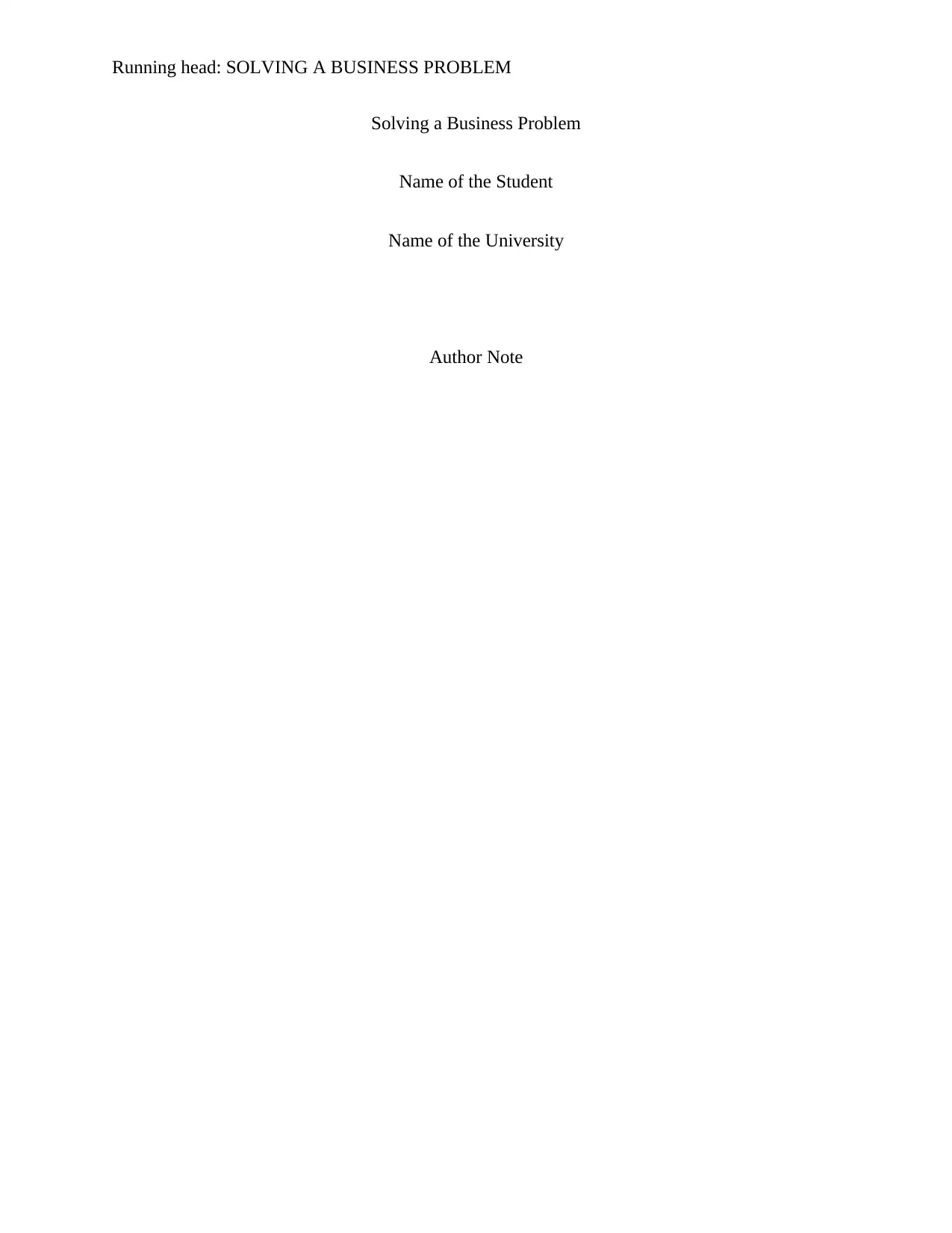
Running head: SOLVING A BUSINESS PROBLEM
Solving a Business Problem
Name of the Student
Name of the University
Author Note
Solving a Business Problem
Name of the Student
Name of the University
Author Note
Paraphrase This Document
Need a fresh take? Get an instant paraphrase of this document with our AI Paraphraser
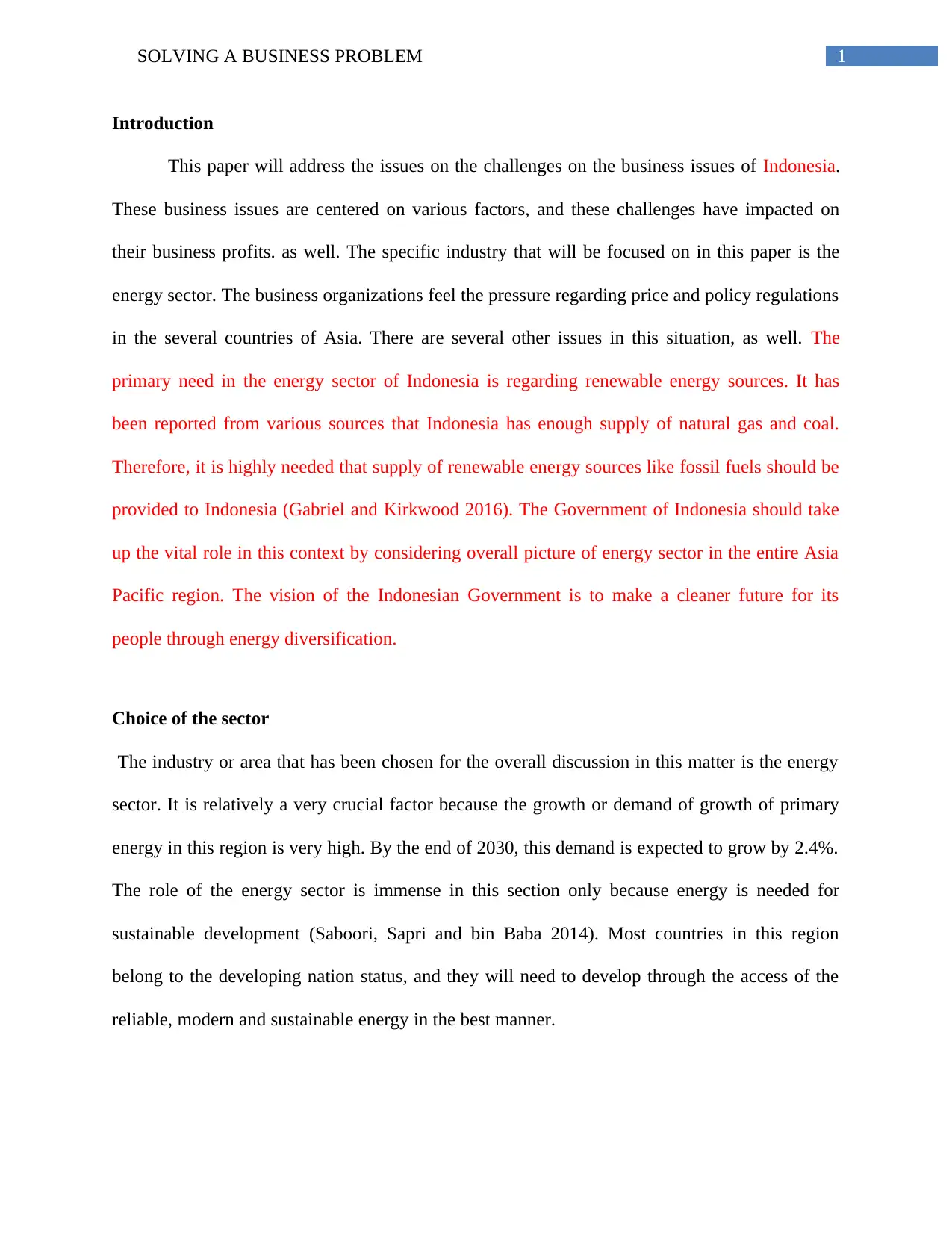
1SOLVING A BUSINESS PROBLEM
Introduction
This paper will address the issues on the challenges on the business issues of Indonesia.
These business issues are centered on various factors, and these challenges have impacted on
their business profits. as well. The specific industry that will be focused on in this paper is the
energy sector. The business organizations feel the pressure regarding price and policy regulations
in the several countries of Asia. There are several other issues in this situation, as well. The
primary need in the energy sector of Indonesia is regarding renewable energy sources. It has
been reported from various sources that Indonesia has enough supply of natural gas and coal.
Therefore, it is highly needed that supply of renewable energy sources like fossil fuels should be
provided to Indonesia (Gabriel and Kirkwood 2016). The Government of Indonesia should take
up the vital role in this context by considering overall picture of energy sector in the entire Asia
Pacific region. The vision of the Indonesian Government is to make a cleaner future for its
people through energy diversification.
Choice of the sector
The industry or area that has been chosen for the overall discussion in this matter is the energy
sector. It is relatively a very crucial factor because the growth or demand of growth of primary
energy in this region is very high. By the end of 2030, this demand is expected to grow by 2.4%.
The role of the energy sector is immense in this section only because energy is needed for
sustainable development (Saboori, Sapri and bin Baba 2014). Most countries in this region
belong to the developing nation status, and they will need to develop through the access of the
reliable, modern and sustainable energy in the best manner.
Introduction
This paper will address the issues on the challenges on the business issues of Indonesia.
These business issues are centered on various factors, and these challenges have impacted on
their business profits. as well. The specific industry that will be focused on in this paper is the
energy sector. The business organizations feel the pressure regarding price and policy regulations
in the several countries of Asia. There are several other issues in this situation, as well. The
primary need in the energy sector of Indonesia is regarding renewable energy sources. It has
been reported from various sources that Indonesia has enough supply of natural gas and coal.
Therefore, it is highly needed that supply of renewable energy sources like fossil fuels should be
provided to Indonesia (Gabriel and Kirkwood 2016). The Government of Indonesia should take
up the vital role in this context by considering overall picture of energy sector in the entire Asia
Pacific region. The vision of the Indonesian Government is to make a cleaner future for its
people through energy diversification.
Choice of the sector
The industry or area that has been chosen for the overall discussion in this matter is the energy
sector. It is relatively a very crucial factor because the growth or demand of growth of primary
energy in this region is very high. By the end of 2030, this demand is expected to grow by 2.4%.
The role of the energy sector is immense in this section only because energy is needed for
sustainable development (Saboori, Sapri and bin Baba 2014). Most countries in this region
belong to the developing nation status, and they will need to develop through the access of the
reliable, modern and sustainable energy in the best manner.
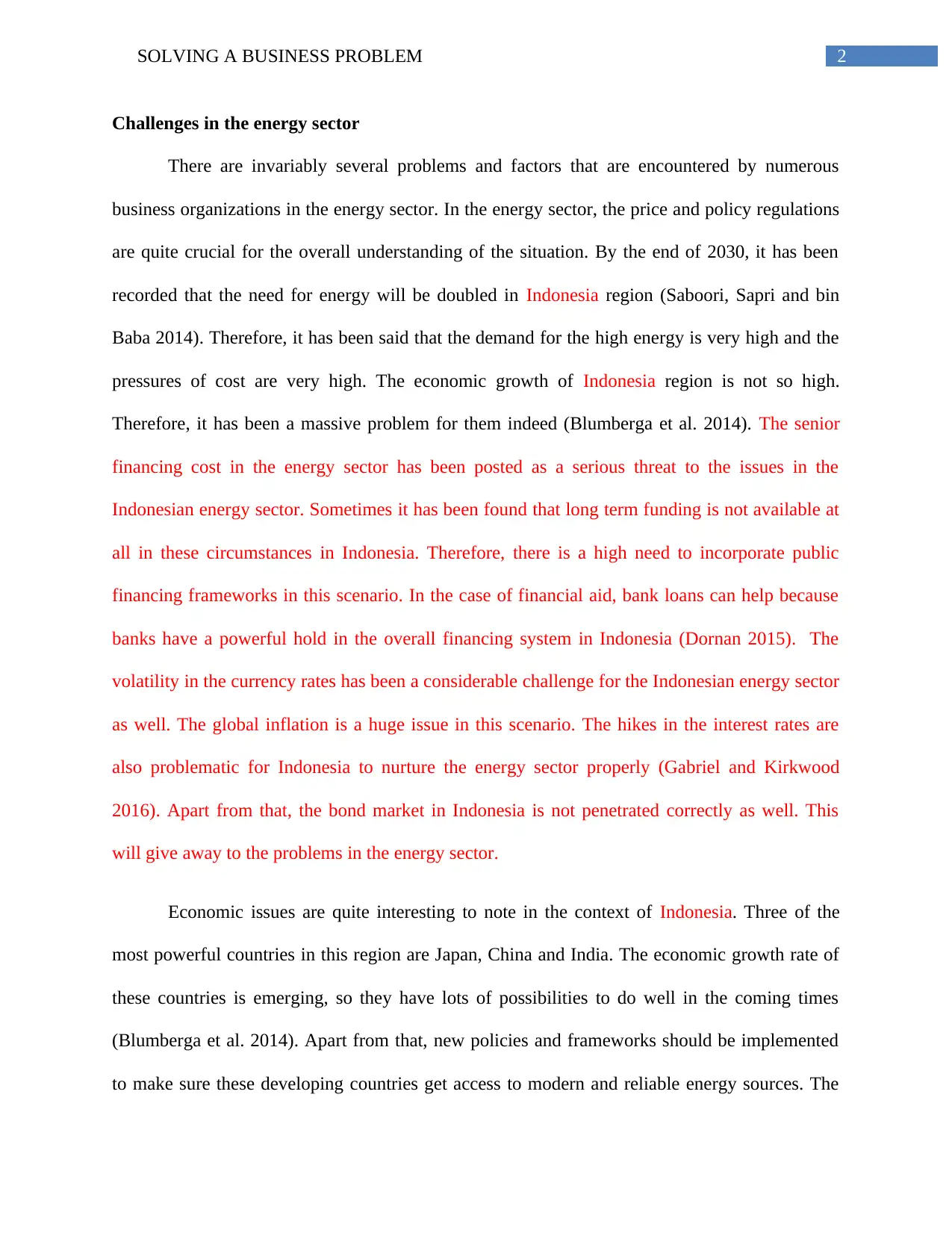
2SOLVING A BUSINESS PROBLEM
Challenges in the energy sector
There are invariably several problems and factors that are encountered by numerous
business organizations in the energy sector. In the energy sector, the price and policy regulations
are quite crucial for the overall understanding of the situation. By the end of 2030, it has been
recorded that the need for energy will be doubled in Indonesia region (Saboori, Sapri and bin
Baba 2014). Therefore, it has been said that the demand for the high energy is very high and the
pressures of cost are very high. The economic growth of Indonesia region is not so high.
Therefore, it has been a massive problem for them indeed (Blumberga et al. 2014). The senior
financing cost in the energy sector has been posted as a serious threat to the issues in the
Indonesian energy sector. Sometimes it has been found that long term funding is not available at
all in these circumstances in Indonesia. Therefore, there is a high need to incorporate public
financing frameworks in this scenario. In the case of financial aid, bank loans can help because
banks have a powerful hold in the overall financing system in Indonesia (Dornan 2015). The
volatility in the currency rates has been a considerable challenge for the Indonesian energy sector
as well. The global inflation is a huge issue in this scenario. The hikes in the interest rates are
also problematic for Indonesia to nurture the energy sector properly (Gabriel and Kirkwood
2016). Apart from that, the bond market in Indonesia is not penetrated correctly as well. This
will give away to the problems in the energy sector.
Economic issues are quite interesting to note in the context of Indonesia. Three of the
most powerful countries in this region are Japan, China and India. The economic growth rate of
these countries is emerging, so they have lots of possibilities to do well in the coming times
(Blumberga et al. 2014). Apart from that, new policies and frameworks should be implemented
to make sure these developing countries get access to modern and reliable energy sources. The
Challenges in the energy sector
There are invariably several problems and factors that are encountered by numerous
business organizations in the energy sector. In the energy sector, the price and policy regulations
are quite crucial for the overall understanding of the situation. By the end of 2030, it has been
recorded that the need for energy will be doubled in Indonesia region (Saboori, Sapri and bin
Baba 2014). Therefore, it has been said that the demand for the high energy is very high and the
pressures of cost are very high. The economic growth of Indonesia region is not so high.
Therefore, it has been a massive problem for them indeed (Blumberga et al. 2014). The senior
financing cost in the energy sector has been posted as a serious threat to the issues in the
Indonesian energy sector. Sometimes it has been found that long term funding is not available at
all in these circumstances in Indonesia. Therefore, there is a high need to incorporate public
financing frameworks in this scenario. In the case of financial aid, bank loans can help because
banks have a powerful hold in the overall financing system in Indonesia (Dornan 2015). The
volatility in the currency rates has been a considerable challenge for the Indonesian energy sector
as well. The global inflation is a huge issue in this scenario. The hikes in the interest rates are
also problematic for Indonesia to nurture the energy sector properly (Gabriel and Kirkwood
2016). Apart from that, the bond market in Indonesia is not penetrated correctly as well. This
will give away to the problems in the energy sector.
Economic issues are quite interesting to note in the context of Indonesia. Three of the
most powerful countries in this region are Japan, China and India. The economic growth rate of
these countries is emerging, so they have lots of possibilities to do well in the coming times
(Blumberga et al. 2014). Apart from that, new policies and frameworks should be implemented
to make sure these developing countries get access to modern and reliable energy sources. The
⊘ This is a preview!⊘
Do you want full access?
Subscribe today to unlock all pages.

Trusted by 1+ million students worldwide
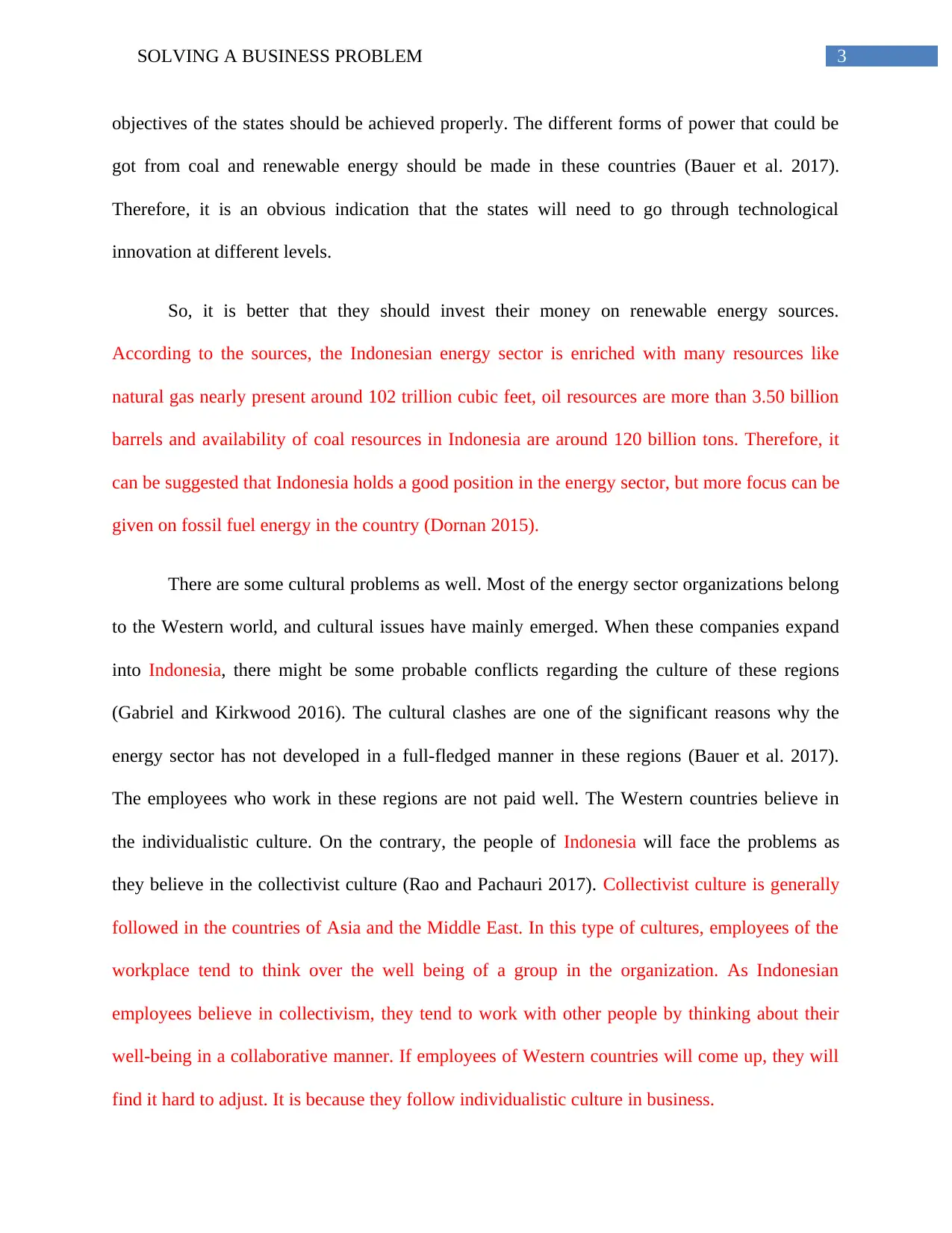
3SOLVING A BUSINESS PROBLEM
objectives of the states should be achieved properly. The different forms of power that could be
got from coal and renewable energy should be made in these countries (Bauer et al. 2017).
Therefore, it is an obvious indication that the states will need to go through technological
innovation at different levels.
So, it is better that they should invest their money on renewable energy sources.
According to the sources, the Indonesian energy sector is enriched with many resources like
natural gas nearly present around 102 trillion cubic feet, oil resources are more than 3.50 billion
barrels and availability of coal resources in Indonesia are around 120 billion tons. Therefore, it
can be suggested that Indonesia holds a good position in the energy sector, but more focus can be
given on fossil fuel energy in the country (Dornan 2015).
There are some cultural problems as well. Most of the energy sector organizations belong
to the Western world, and cultural issues have mainly emerged. When these companies expand
into Indonesia, there might be some probable conflicts regarding the culture of these regions
(Gabriel and Kirkwood 2016). The cultural clashes are one of the significant reasons why the
energy sector has not developed in a full-fledged manner in these regions (Bauer et al. 2017).
The employees who work in these regions are not paid well. The Western countries believe in
the individualistic culture. On the contrary, the people of Indonesia will face the problems as
they believe in the collectivist culture (Rao and Pachauri 2017). Collectivist culture is generally
followed in the countries of Asia and the Middle East. In this type of cultures, employees of the
workplace tend to think over the well being of a group in the organization. As Indonesian
employees believe in collectivism, they tend to work with other people by thinking about their
well-being in a collaborative manner. If employees of Western countries will come up, they will
find it hard to adjust. It is because they follow individualistic culture in business.
objectives of the states should be achieved properly. The different forms of power that could be
got from coal and renewable energy should be made in these countries (Bauer et al. 2017).
Therefore, it is an obvious indication that the states will need to go through technological
innovation at different levels.
So, it is better that they should invest their money on renewable energy sources.
According to the sources, the Indonesian energy sector is enriched with many resources like
natural gas nearly present around 102 trillion cubic feet, oil resources are more than 3.50 billion
barrels and availability of coal resources in Indonesia are around 120 billion tons. Therefore, it
can be suggested that Indonesia holds a good position in the energy sector, but more focus can be
given on fossil fuel energy in the country (Dornan 2015).
There are some cultural problems as well. Most of the energy sector organizations belong
to the Western world, and cultural issues have mainly emerged. When these companies expand
into Indonesia, there might be some probable conflicts regarding the culture of these regions
(Gabriel and Kirkwood 2016). The cultural clashes are one of the significant reasons why the
energy sector has not developed in a full-fledged manner in these regions (Bauer et al. 2017).
The employees who work in these regions are not paid well. The Western countries believe in
the individualistic culture. On the contrary, the people of Indonesia will face the problems as
they believe in the collectivist culture (Rao and Pachauri 2017). Collectivist culture is generally
followed in the countries of Asia and the Middle East. In this type of cultures, employees of the
workplace tend to think over the well being of a group in the organization. As Indonesian
employees believe in collectivism, they tend to work with other people by thinking about their
well-being in a collaborative manner. If employees of Western countries will come up, they will
find it hard to adjust. It is because they follow individualistic culture in business.
Paraphrase This Document
Need a fresh take? Get an instant paraphrase of this document with our AI Paraphraser
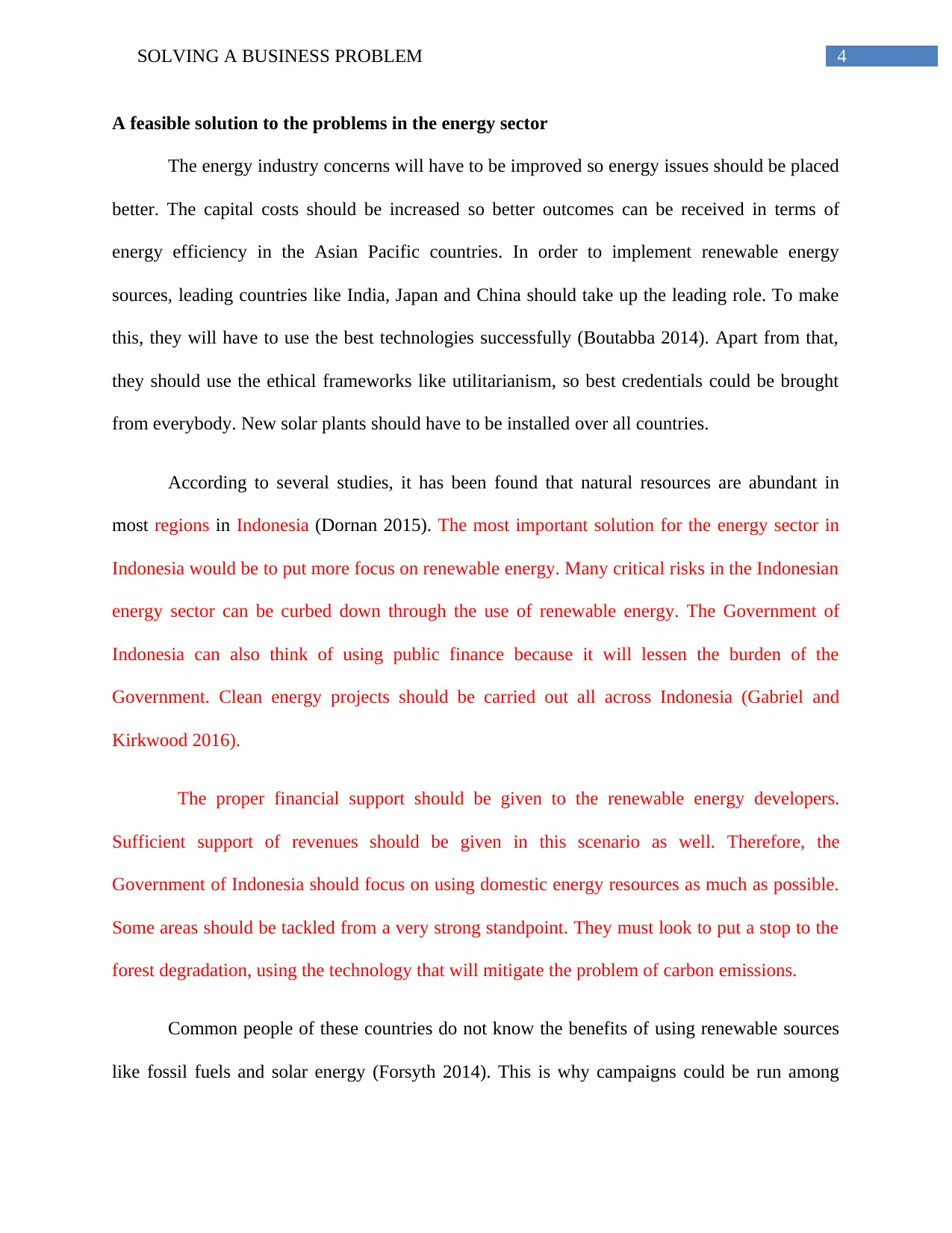
4SOLVING A BUSINESS PROBLEM
A feasible solution to the problems in the energy sector
The energy industry concerns will have to be improved so energy issues should be placed
better. The capital costs should be increased so better outcomes can be received in terms of
energy efficiency in the Asian Pacific countries. In order to implement renewable energy
sources, leading countries like India, Japan and China should take up the leading role. To make
this, they will have to use the best technologies successfully (Boutabba 2014). Apart from that,
they should use the ethical frameworks like utilitarianism, so best credentials could be brought
from everybody. New solar plants should have to be installed over all countries.
According to several studies, it has been found that natural resources are abundant in
most regions in Indonesia (Dornan 2015). The most important solution for the energy sector in
Indonesia would be to put more focus on renewable energy. Many critical risks in the Indonesian
energy sector can be curbed down through the use of renewable energy. The Government of
Indonesia can also think of using public finance because it will lessen the burden of the
Government. Clean energy projects should be carried out all across Indonesia (Gabriel and
Kirkwood 2016).
The proper financial support should be given to the renewable energy developers.
Sufficient support of revenues should be given in this scenario as well. Therefore, the
Government of Indonesia should focus on using domestic energy resources as much as possible.
Some areas should be tackled from a very strong standpoint. They must look to put a stop to the
forest degradation, using the technology that will mitigate the problem of carbon emissions.
Common people of these countries do not know the benefits of using renewable sources
like fossil fuels and solar energy (Forsyth 2014). This is why campaigns could be run among
A feasible solution to the problems in the energy sector
The energy industry concerns will have to be improved so energy issues should be placed
better. The capital costs should be increased so better outcomes can be received in terms of
energy efficiency in the Asian Pacific countries. In order to implement renewable energy
sources, leading countries like India, Japan and China should take up the leading role. To make
this, they will have to use the best technologies successfully (Boutabba 2014). Apart from that,
they should use the ethical frameworks like utilitarianism, so best credentials could be brought
from everybody. New solar plants should have to be installed over all countries.
According to several studies, it has been found that natural resources are abundant in
most regions in Indonesia (Dornan 2015). The most important solution for the energy sector in
Indonesia would be to put more focus on renewable energy. Many critical risks in the Indonesian
energy sector can be curbed down through the use of renewable energy. The Government of
Indonesia can also think of using public finance because it will lessen the burden of the
Government. Clean energy projects should be carried out all across Indonesia (Gabriel and
Kirkwood 2016).
The proper financial support should be given to the renewable energy developers.
Sufficient support of revenues should be given in this scenario as well. Therefore, the
Government of Indonesia should focus on using domestic energy resources as much as possible.
Some areas should be tackled from a very strong standpoint. They must look to put a stop to the
forest degradation, using the technology that will mitigate the problem of carbon emissions.
Common people of these countries do not know the benefits of using renewable sources
like fossil fuels and solar energy (Forsyth 2014). This is why campaigns could be run among
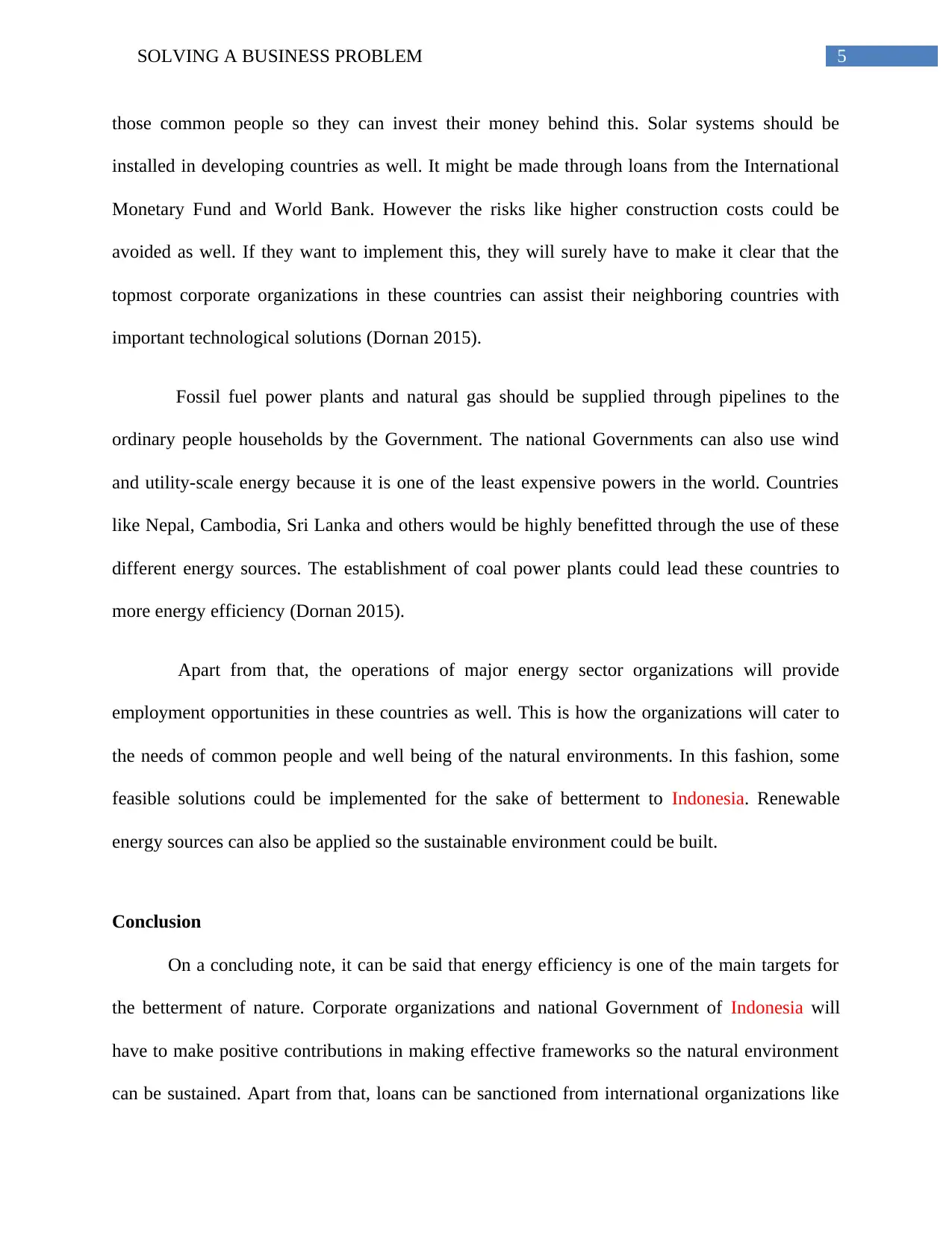
5SOLVING A BUSINESS PROBLEM
those common people so they can invest their money behind this. Solar systems should be
installed in developing countries as well. It might be made through loans from the International
Monetary Fund and World Bank. However the risks like higher construction costs could be
avoided as well. If they want to implement this, they will surely have to make it clear that the
topmost corporate organizations in these countries can assist their neighboring countries with
important technological solutions (Dornan 2015).
Fossil fuel power plants and natural gas should be supplied through pipelines to the
ordinary people households by the Government. The national Governments can also use wind
and utility-scale energy because it is one of the least expensive powers in the world. Countries
like Nepal, Cambodia, Sri Lanka and others would be highly benefitted through the use of these
different energy sources. The establishment of coal power plants could lead these countries to
more energy efficiency (Dornan 2015).
Apart from that, the operations of major energy sector organizations will provide
employment opportunities in these countries as well. This is how the organizations will cater to
the needs of common people and well being of the natural environments. In this fashion, some
feasible solutions could be implemented for the sake of betterment to Indonesia. Renewable
energy sources can also be applied so the sustainable environment could be built.
Conclusion
On a concluding note, it can be said that energy efficiency is one of the main targets for
the betterment of nature. Corporate organizations and national Government of Indonesia will
have to make positive contributions in making effective frameworks so the natural environment
can be sustained. Apart from that, loans can be sanctioned from international organizations like
those common people so they can invest their money behind this. Solar systems should be
installed in developing countries as well. It might be made through loans from the International
Monetary Fund and World Bank. However the risks like higher construction costs could be
avoided as well. If they want to implement this, they will surely have to make it clear that the
topmost corporate organizations in these countries can assist their neighboring countries with
important technological solutions (Dornan 2015).
Fossil fuel power plants and natural gas should be supplied through pipelines to the
ordinary people households by the Government. The national Governments can also use wind
and utility-scale energy because it is one of the least expensive powers in the world. Countries
like Nepal, Cambodia, Sri Lanka and others would be highly benefitted through the use of these
different energy sources. The establishment of coal power plants could lead these countries to
more energy efficiency (Dornan 2015).
Apart from that, the operations of major energy sector organizations will provide
employment opportunities in these countries as well. This is how the organizations will cater to
the needs of common people and well being of the natural environments. In this fashion, some
feasible solutions could be implemented for the sake of betterment to Indonesia. Renewable
energy sources can also be applied so the sustainable environment could be built.
Conclusion
On a concluding note, it can be said that energy efficiency is one of the main targets for
the betterment of nature. Corporate organizations and national Government of Indonesia will
have to make positive contributions in making effective frameworks so the natural environment
can be sustained. Apart from that, loans can be sanctioned from international organizations like
⊘ This is a preview!⊘
Do you want full access?
Subscribe today to unlock all pages.

Trusted by 1+ million students worldwide

6SOLVING A BUSINESS PROBLEM
the World Bank and IMF so common people could be benefitted highly. There are several
options for the countries to use renewable energy sources like fossil fuels, solar energy and
natural gas. These situations could solve capital cost barriers to implement effective systems in
the market.
the World Bank and IMF so common people could be benefitted highly. There are several
options for the countries to use renewable energy sources like fossil fuels, solar energy and
natural gas. These situations could solve capital cost barriers to implement effective systems in
the market.
Paraphrase This Document
Need a fresh take? Get an instant paraphrase of this document with our AI Paraphraser
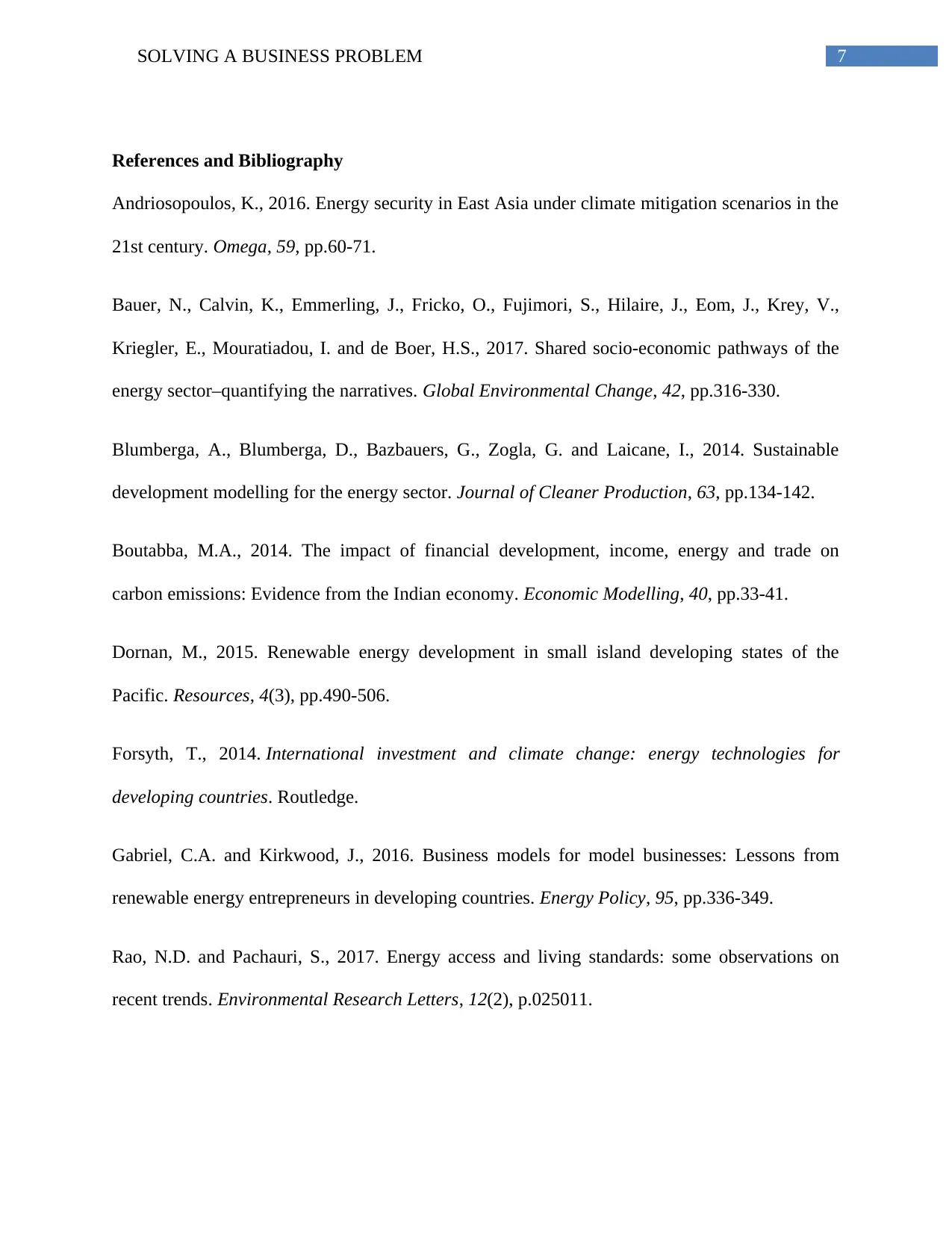
7SOLVING A BUSINESS PROBLEM
References and Bibliography
Andriosopoulos, K., 2016. Energy security in East Asia under climate mitigation scenarios in the
21st century. Omega, 59, pp.60-71.
Bauer, N., Calvin, K., Emmerling, J., Fricko, O., Fujimori, S., Hilaire, J., Eom, J., Krey, V.,
Kriegler, E., Mouratiadou, I. and de Boer, H.S., 2017. Shared socio-economic pathways of the
energy sector–quantifying the narratives. Global Environmental Change, 42, pp.316-330.
Blumberga, A., Blumberga, D., Bazbauers, G., Zogla, G. and Laicane, I., 2014. Sustainable
development modelling for the energy sector. Journal of Cleaner Production, 63, pp.134-142.
Boutabba, M.A., 2014. The impact of financial development, income, energy and trade on
carbon emissions: Evidence from the Indian economy. Economic Modelling, 40, pp.33-41.
Dornan, M., 2015. Renewable energy development in small island developing states of the
Pacific. Resources, 4(3), pp.490-506.
Forsyth, T., 2014. International investment and climate change: energy technologies for
developing countries. Routledge.
Gabriel, C.A. and Kirkwood, J., 2016. Business models for model businesses: Lessons from
renewable energy entrepreneurs in developing countries. Energy Policy, 95, pp.336-349.
Rao, N.D. and Pachauri, S., 2017. Energy access and living standards: some observations on
recent trends. Environmental Research Letters, 12(2), p.025011.
References and Bibliography
Andriosopoulos, K., 2016. Energy security in East Asia under climate mitigation scenarios in the
21st century. Omega, 59, pp.60-71.
Bauer, N., Calvin, K., Emmerling, J., Fricko, O., Fujimori, S., Hilaire, J., Eom, J., Krey, V.,
Kriegler, E., Mouratiadou, I. and de Boer, H.S., 2017. Shared socio-economic pathways of the
energy sector–quantifying the narratives. Global Environmental Change, 42, pp.316-330.
Blumberga, A., Blumberga, D., Bazbauers, G., Zogla, G. and Laicane, I., 2014. Sustainable
development modelling for the energy sector. Journal of Cleaner Production, 63, pp.134-142.
Boutabba, M.A., 2014. The impact of financial development, income, energy and trade on
carbon emissions: Evidence from the Indian economy. Economic Modelling, 40, pp.33-41.
Dornan, M., 2015. Renewable energy development in small island developing states of the
Pacific. Resources, 4(3), pp.490-506.
Forsyth, T., 2014. International investment and climate change: energy technologies for
developing countries. Routledge.
Gabriel, C.A. and Kirkwood, J., 2016. Business models for model businesses: Lessons from
renewable energy entrepreneurs in developing countries. Energy Policy, 95, pp.336-349.
Rao, N.D. and Pachauri, S., 2017. Energy access and living standards: some observations on
recent trends. Environmental Research Letters, 12(2), p.025011.
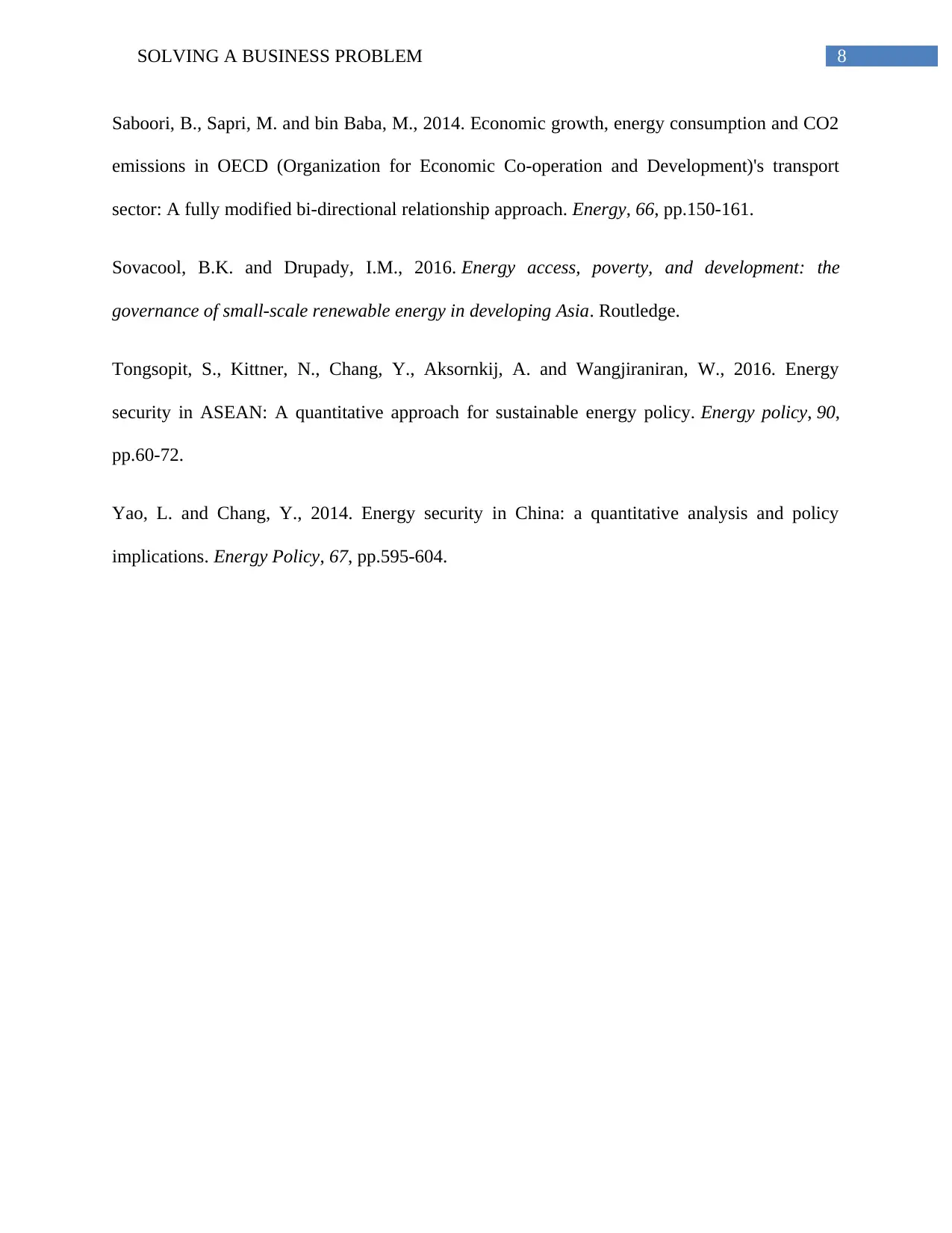
8SOLVING A BUSINESS PROBLEM
Saboori, B., Sapri, M. and bin Baba, M., 2014. Economic growth, energy consumption and CO2
emissions in OECD (Organization for Economic Co-operation and Development)'s transport
sector: A fully modified bi-directional relationship approach. Energy, 66, pp.150-161.
Sovacool, B.K. and Drupady, I.M., 2016. Energy access, poverty, and development: the
governance of small-scale renewable energy in developing Asia. Routledge.
Tongsopit, S., Kittner, N., Chang, Y., Aksornkij, A. and Wangjiraniran, W., 2016. Energy
security in ASEAN: A quantitative approach for sustainable energy policy. Energy policy, 90,
pp.60-72.
Yao, L. and Chang, Y., 2014. Energy security in China: a quantitative analysis and policy
implications. Energy Policy, 67, pp.595-604.
Saboori, B., Sapri, M. and bin Baba, M., 2014. Economic growth, energy consumption and CO2
emissions in OECD (Organization for Economic Co-operation and Development)'s transport
sector: A fully modified bi-directional relationship approach. Energy, 66, pp.150-161.
Sovacool, B.K. and Drupady, I.M., 2016. Energy access, poverty, and development: the
governance of small-scale renewable energy in developing Asia. Routledge.
Tongsopit, S., Kittner, N., Chang, Y., Aksornkij, A. and Wangjiraniran, W., 2016. Energy
security in ASEAN: A quantitative approach for sustainable energy policy. Energy policy, 90,
pp.60-72.
Yao, L. and Chang, Y., 2014. Energy security in China: a quantitative analysis and policy
implications. Energy Policy, 67, pp.595-604.
⊘ This is a preview!⊘
Do you want full access?
Subscribe today to unlock all pages.

Trusted by 1+ million students worldwide
1 out of 9
Related Documents
Your All-in-One AI-Powered Toolkit for Academic Success.
+13062052269
info@desklib.com
Available 24*7 on WhatsApp / Email
![[object Object]](/_next/static/media/star-bottom.7253800d.svg)
Unlock your academic potential
Copyright © 2020–2025 A2Z Services. All Rights Reserved. Developed and managed by ZUCOL.





